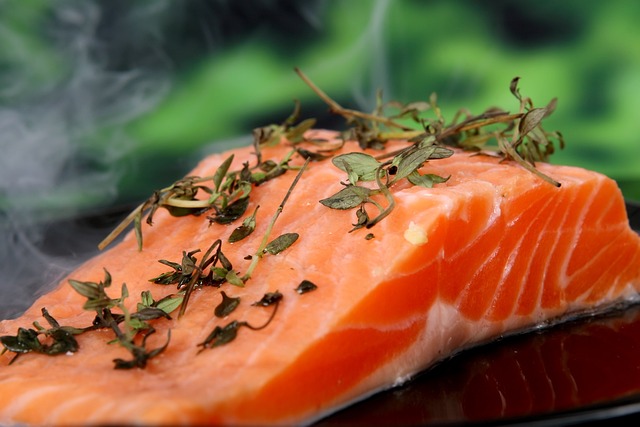The health benefits of salmon make it worth considering if you’re concerned about its fat content. While salmon is an oily fish with a significant amount of fat, it’s important to note that this fat is beneficial for both the heart and skin, making it a healthy choice.
Salmon is a highly beneficial dietary option for promoting the well-being of both the heart and brain. Numerous medical research studies have established that incorporating omega-3 fatty acids, ranging from 0.45 to 4.5 grams, into one’s diet can yield notable improvements in heart performance, blood pressure reduction, and inflammation mitigation. Furthermore, salmon’s inclusion in meals can positively affect cognitive health as it contains DHA, a specific type of omega-3 fatty acid known for its brain-boosting effects.
It is important to consider that wild salmon offers greater nutritional value compared to farmed salmon. While farmed salmon is raised on a diet primarily composed of artificial pellets, wild salmon naturally feed on crustaceans, flies, and smaller fish. Therefore, opting for wild-caught salmon is more beneficial for your health compared to consuming salmon from a hatchery. You can purchase the best luxury smoked salmon from reputable sellers like Lambton & Jackson.
Here are the top health advantages of consuming salmon
Regular exercise has a positive impact on the health of our cardiovascular system.
Salmon is recognized as a valuable resource for essential omega-3 fatty acids (EPA and DHA) as well as potassium. These nutrients play a crucial role in promoting heart health by reducing inflammation in the arteries, decreasing cholesterol levels, and regulating blood pressure. Potassium, in particular, helps maintain optimal blood pressure levels and prevents the retention of excess fluids. As a result, incorporating salmon into one’s regular diet can substantially decrease the risk of cardiovascular issues such as heart attacks, strokes, arrhythmia, hypertension, and elevated triglyceride levels.
Restores and heals injured tissues
Salmon provides an abundant amount of protein, making it a beneficial dietary choice. Notably, protein serves as the fundamental component for vital bodily structures like bones, muscles, cartilage, skin, and blood. It plays a crucial role in tissue regeneration and restoration following injuries and aids in preserving bone health while undergoing weight loss. Additionally, protein intake helps maintain a robust metabolic rate and enhances bone density and strength.
A fantastic source of vitamin B complex
Salmon contains a wealth of various B vitamins, including B3, B5, B7, B6, B9, B12, and others. These vitamins, collectively known as the B complex, play a crucial role in maintaining overall bodily functions. Working synergistically, the B vitamins aid in the conversion of food into energy, facilitate DNA creation and repair and help reduce inflammation. Out of the entire B vitamin group, salmon is particularly abundant in B3 (niacin) and B6. Niacin contributes to cholesterol reduction, while B6 supports brain health. Additionally, salmon provides a significant amount of B12, which is crucial for the proper functioning of the brain and nervous system, hormonal balance, and various metabolic functions.
Helps support the healthy functioning of the thyroid gland
Selenium plays a vital role in ensuring the proper functioning of the thyroid gland. Consuming a good serving of salmon can supply a significant quantity of selenium, an essential trace mineral. This micronutrient safeguards the thyroid gland against oxidative harm that may occur during the production of thyroid hormone. The thyroid gland’s cells generate hydrogen peroxide, which is utilized in the synthesis of this hormone.
Supports cognitive well-being
Salmon’s abundance of DHA collaborates with vitamin A, vitamin D, and selenium to enhance cognitive abilities. Notably, omega-3 fatty acid supplements are utilized in the treatment of psychological disorders such as Alzheimer’s and Parkinson’s disease. Consuming salmon while pregnant can contribute to the enhanced development and well-being of the fetal brain.
